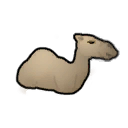Dromedary
Dromedary
"A large land mammal adapted to arid environments. Domesticated since ancient times, its wool and leather are both exceptionally good at insulating against the desert heat, and its milk is quite nourishing. It can be used as a pack animal and mount, but its bouncing gait makes it slower to ride than a horse.
By storing water in its large humps and reclaiming moisture from its breath as it exhales, it can go weeks without drinking.
Base Stats
Pawn Stats
- Move Speed
- 4.30 c/s
- Health Scale
- 160% HP
- Body Size
- 2.1
- Mass - Baby
- 25.2 kg
- Mass - Juvenile
- 63 kg
- Mass - Adult
- 126 kg
- Carrying Capacity
- 158 kg
- Filth Rate
- 16
- Hunger Rate
- 0.86 Nutrition/Day
- Diet
- herbivorous
- Life Expectancy
- 45 years
- Manhunter Chance
- 0%
- Manhunter Chance (Taming)
- 0%
- Trainable Intelligence
- None
- Wildness
- 25%
- Minimum Handling Skill
- 1
- Maturity Age
- 0.333 years (20 days)
- Juvenile Age
- 0.25 years (15 days)
- Comfortable Temp Range
- -22 °C – 60 °C (-7.6 °F – 140 °F)
Production
- Leather Yield
- 84
 camelhide
camelhide - Milk Amount
- 18
 milk
milk - Milking Interval
- 2 days
- Gestation Period
- 6.66 days
- Offspring Per Birth
- 1
Melee Combat
-
"Poke/blunt" is not in the list (Cut, Crush, Blunt, Poke, Demolish, Stab, Scratch, Toxic scratch, Bite, Toxic bite) of allowed values for the "Attack 1 Type" property.
- Attack 1
- Front left leg
9 dmg (Poke/blunt)
13 % AP
2 second cooldown - Attack 2
- Front right leg
9 dmg (Poke/blunt)
13 % AP
2 second cooldown - Attack 3
- Teeth
10 dmg (Bite)
15 % AP
2 second cooldown - Attack 4
- Head
7 dmg (Blunt)
10 % AP
2 second cooldown - Average DPS
- 2.71
Desert-dwelling, shrub-eating quadrupeds, dromedaries are one-humped camels. They can often be found in small herds. When enraged, they can melee and can become somewhat dangerous, comparable to deer.
These creatures can be hunted and butchered by colonists for a plentiful supply of meat. This is especially valuable, considering the scarcity of food in their native desert environment.
They also provide a large quantity of leather compared to other creatures that spawn in the same biomes, making them useful for a crafting-based economy. Their leather is a sandy brown color.
A Dromedary will also increase the carrying capacity of any caravan it's part of by 70 kg making them an excellent pack animal.
Taming
Dromedaries are notable for requiring no minimum skill level to tame.
Production
Handlers are required to harvest resources from animals.
Female dromedaries can be milked once every 2 days, producing 12 milk.
Note that while cows are faster milk producers, dromedaries produce milk AND are pack animals, which is a combo that muffalos no longer provide. While yaks are also pack animals that produce milk, dromedaries carry more, are faster, and produce the same amount of milk at the same rate.
See Animal Products for more details on how much each type of animal produces.
Training
This animal can be trained as follows:
| Guard: | |
|---|---|
| Attack: | |
| Rescue: | |
| Haul: | |
*As of version 1.1.2610, all animals can be tamed. The percentage of likelihood of success depends on factors such as the Animals Wildness Percentage, Pawn Handling Skill, and others. More information can be found on the animals page.
Health
Version History
- 0.7.581 - Added as camel
- 0.12.906 - Can now be shorn for wool and milked.
- Beta 19/1.0 - leg damage 11 -> 8
- 1.1 - dromedaries no longer produce wool in the form of camelhair.
